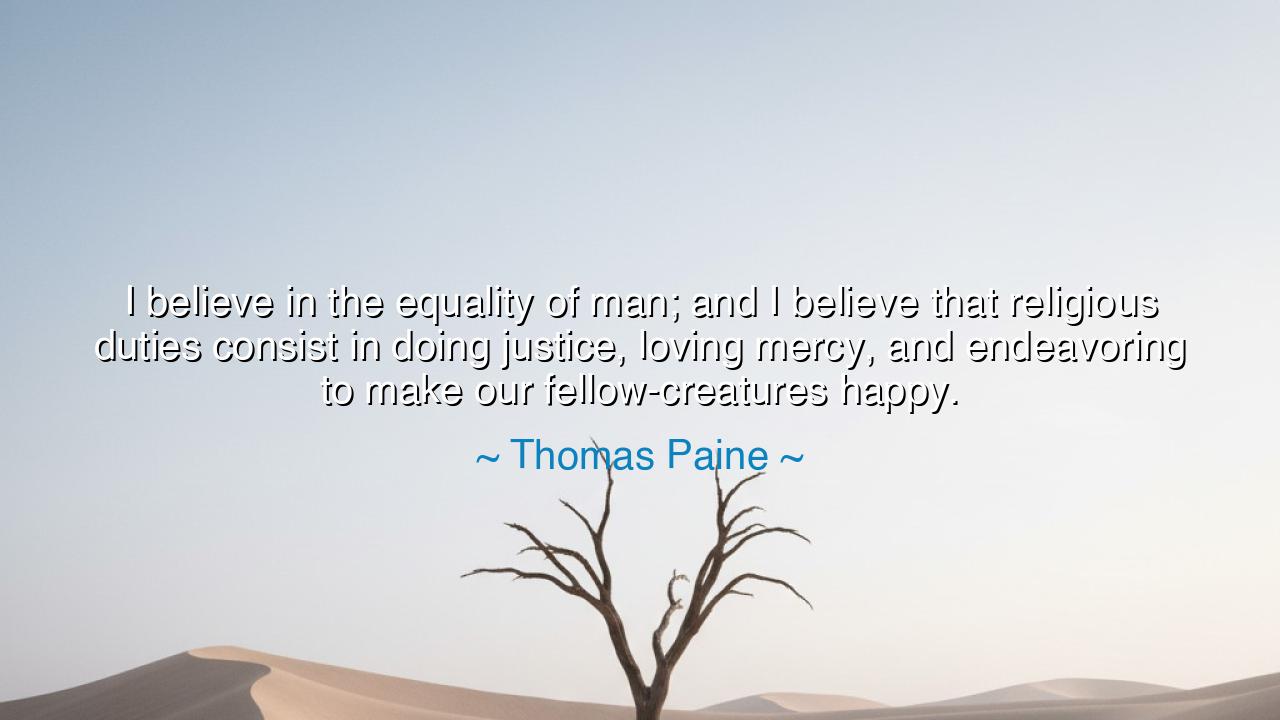
I believe in the equality of man; and I believe that religious
I believe in the equality of man; and I believe that religious duties consist in doing justice, loving mercy, and endeavoring to make our fellow-creatures happy.






"I believe in the equality of man; and I believe that religious duties consist in doing justice, loving mercy, and endeavoring to make our fellow-creatures happy." Thus spoke Thomas Paine, a prophet of liberty, whose words helped ignite revolutions and awaken the conscience of nations. In these lines, Paine strips away the weight of ritual and dogma, calling men to the heart of all true religion—not ceremonies, not rigid creeds, but the living acts of justice, mercy, and compassion. His voice was both a trumpet and a balm: a trumpet to rally the oppressed, and a balm to soothe the suffering.
The origin of this wisdom lies in the age of revolution, when kings and priests often bound men in chains, claiming divine right as their shield. Paine, born of humble means, saw clearly that power must not rest in the hands of the few, nor should religion be wielded as a weapon of oppression. Instead, he proclaimed that all men are equal in their humanity, and that true faith is measured not by words recited, but by deeds performed. To do justice is to honor the dignity of each person; to love mercy is to soften the hard edges of life; to make others happy is to fulfill the law of love itself.
Consider the story of William Wilberforce, who, in the British Parliament, raised his voice against the slave trade. He did not see this as mere politics, but as a sacred duty to justice and mercy. Though mocked, resisted, and opposed for decades, he persevered until the trade was abolished. Wilberforce understood, as Paine declared, that religious duty is not to build temples of stone, but to break the chains of the oppressed, to wipe tears from the faces of the afflicted, to restore dignity to those crushed by cruelty. Here, in history, we see Paine’s words become flesh.
The teaching is also deeply personal. To believe in the equality of man is to see no one as beneath you and no one as above you, but all as fellow travelers in this brief journey of life. In this vision, the beggar on the street is your brother, the stranger your kin, the enemy still your fellow creature. And in this recognition is born humility, the mother of peace. Without this belief, there can be no true justice, only domination; no true mercy, only condescension; no true happiness, only fleeting pleasures built upon the misery of others.
Yet, Paine’s words are also a sword against hypocrisy. Too often, men profess religion with their lips while denying it with their lives. They pray loudly, yet cheat their neighbor; they sing hymns, yet oppress the weak. Paine calls such pretense empty, for the true test of faith is found not in public display but in the quiet acts of righteousness: in fairness, in kindness, in the pursuit of another’s good. His creed is simple, but it cuts to the core: justice, mercy, and happiness for all.
The lesson, then, is clear. If you would be faithful, live by these three pillars. Do not merely recite prayers—become a prayer. Let your hands do the work of justice, your heart overflow with mercy, your presence bring joy to others. In so doing, you will honor not only God, but humanity itself. This is the religion that cannot be corrupted, for it is written not on parchment but on the human heart.
What practical steps must we take? Seek each day an act of justice, even in small things: be honest in your dealings, defend those who are wronged. Practice mercy: forgive quickly, show patience where anger would be easy, lend help where judgment would be harsh. And finally, bring happiness where you can: a word of kindness, a shared burden, a gesture of care. These are not grand tasks, but when multiplied across a life, they build a temple more enduring than stone.
So let the words of Paine be carried forward: the equality of man, the doing of justice, the loving of mercy, and the making of others happy. This is the true religion of the soul, the path of light for all generations. Walk it with courage, and you will leave behind not monuments of stone, but monuments of love written upon the hearts of those whose lives you touched.






AAdministratorAdministrator
Welcome, honored guests. Please leave a comment, we will respond soon